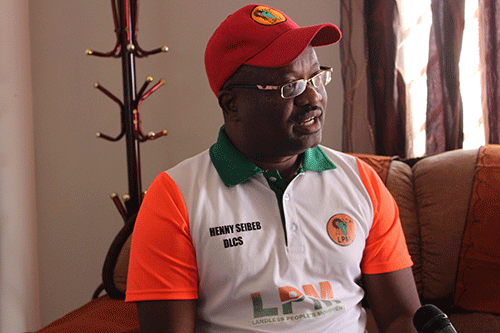Staff Reporter
Landless People’s Movement (LPM) deputy leader Henny Seibeb has bemoaned Namibia’s resettlement policy, saying the programme is “skewed and favours the well-connected”. He has also called on President Hage Geingob to sack Prime Minister Saara Kuugongelwa-Amadhila, whom the party has accused of unduly benefitting from land deals.
Seibeb said this yesterday while addressing the media following his return from a fact-finding mission to the Otjozondjupa and Oshikoto regions recently. The LPM claimed it visited the Hai//om communities living in the Saamstaan informal settlement in Grootfontein, Farm Duwib as well as the informal settlement in Otavi. “The LPM rejects the current resettlement policy, which creates a facade for indigenous communities to access land, especially in clear cut instances like in the case of Farm Duwib,” Seibeb said. In April, agriculture minister Calle Schlettwein twice explained two farms offered to the State by Kuugongelwa-Amadhila and her husband Onesmus Amadhila.
The properties in question – Farm Duwib No.1 14, measuring 5 008 hectares, and portion 1, called Agenab, measuring 2 750 hectares, of Farm Goab No. 760 – were registered under a company called Seize The Moment Investment Fifty Six Corporation in which the prime minister and her husband are shareholders. According to Seibeb, “there still exists skewed distribution of resources in land distribution in favour of well-off beneficiaries”.
He attributed the skewness of land distribution to the policy biases, which prioritise commercial success as an overriding goal in land reform. “In our understanding, elite capture unfolds at various points within the land reform process and is attributable to a number of factors, which include manipulative practices where different actors exploit policy ambiguities and institutional weaknesses, and implicit and explicit forms of corruption, nepotism and rent-seeking practices,” he said.
He said the elite capture is occasioned by the presence of unequal power based on various factors, which may include economic wealth, gender and political affiliation. According to him, the well-off beneficiaries (urban-based business individuals, former state bureaucrats and local politicians) with access to material resources, knowledge and information often qualify as beneficiaries.
“State bureaucrats and the politically powerful often capture resources in land reform through the following practices: the soliciting and payment of bribes, fronting, the imposition of politically connected beneficiaries and bailing out politically connected people,” Seibeb said.
Furthermore, Seibeb said they continue to hear about land grabbing by high-ranking government officials.Therefore, Seibeb called on the Standing Committee of Public Accounts of the National Assembly to call for an inquiry into the scam.
Caption:
Henny Seibeb


